01/15/20
K-State Current - January 15, 2020
K-State Current is a weekly news update for the Kansas Board of Regents to apprise the Regents on a few of the many successes and achievements made by K-State faculty, staff and students.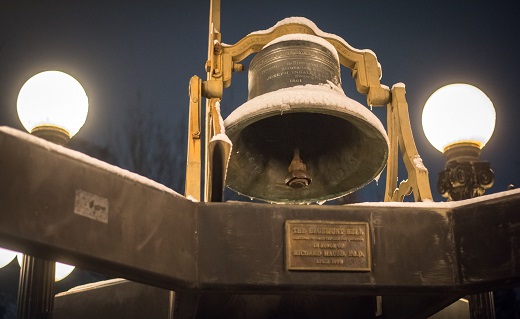
K-State News
Former Colombian President Juan Manuel Santos presenting Landon Lecture on Feb. 4
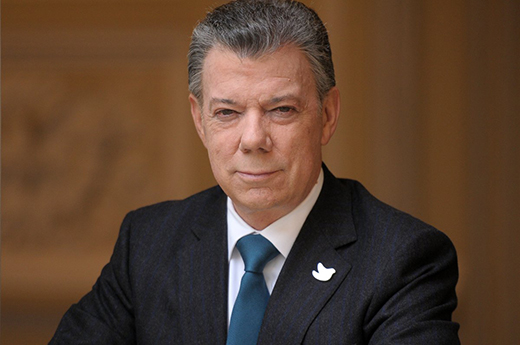 A former two-term president of the South American nation of Colombia and winner of the Nobel Peace Prize will present the first Landon Lecture of the spring 2020 semester at Kansas State University. Juan Manuel Santos will speak at 10 a.m. Tuesday, Feb. 4, in Forum Hall at the K-State Student Union. Doors will open at 9:30 a.m.
A former two-term president of the South American nation of Colombia and winner of the Nobel Peace Prize will present the first Landon Lecture of the spring 2020 semester at Kansas State University. Juan Manuel Santos will speak at 10 a.m. Tuesday, Feb. 4, in Forum Hall at the K-State Student Union. Doors will open at 9:30 a.m.
During his tenure as president from 2010-2018, Santos is credited with ushering in a new era of prosperity, peace, equity and education throughout Colombia. His tenacity and determination to achieve peace and reconciliation in his country earned Santos the 2016 Nobel Peace Prize, which recognized his efforts to bring the country's more than 50-year-long civil war to an end. Santos has been twice-named to TIME’s "100 Most Influential People" and received the World Economic Forum’s Global Statesman Award.
"Kansas State University's Landon Lecture series is known for bringing top global leaders to campus," said Linda Cook, chair of the Landon Lecture Series and K-State chief of staff and director of community relations. "As one of the most recognized and influential leaders in the world today, we look forward to the insights and analysis President Santos will share with students, faculty, staff and the public."
Santos' lecture is free and members of the university community and public are encouraged to attend.
During Santos' presidency, Colombia became the region's leader in economic growth, job creation, reduction of poverty and extreme poverty, sustainable development, and the enhancement of information and communications technology. In addition, his administration reduced the country's housing deficit by half and launched the most ambitious infrastructure plan in Colombia's history.
Santos is the author of several books, including "The Third Way," which he wrote with former British Prime Minister Tony Blair, and "Jaque al Terror" or "Checkmate to Terror," in which he describes how he successfully fought the Revolutionary Armed Forces of Colombia, known as the FARC.
Before becoming president of Colombia, Santos served in several capacities of the Colombian government, including as foreign trade minister, finance and public credit minister, and national defense minister.
One of the most prestigious lecture series offered at a U.S. college or university, the Alfred M. Landon Lecture Series was instituted in 1966 by former Kansas State University President James A. McCain. The series is a tribute to Alfred M. Landon, who served as governor of Kansas from 1933-1937 and delivered the first lecture in the series.
University's general counsel announces upcoming retirement
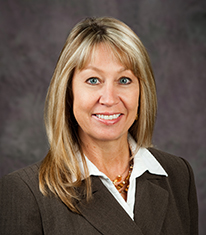 Kansas State University General Counsel Cheryl Strecker has announced her retirement, effective in April 2020.
Kansas State University General Counsel Cheryl Strecker has announced her retirement, effective in April 2020.
Strecker has been a member of the university's legal team since 1993, including the last 10 years as general counsel and leader of the Office of General Counsel. Her work has contributed to the office's success rate of 99% wins in the litigation of court and administrative agency cases in the last 29 years.
Under Strecker's leadership, the Office of General Counsel provides legal advice, assistance and representation to all university campuses through its administrators and employees who are acting on the university’s behalf. This work includes legal research, client counseling, internal dispute resolution, and litigation before state and federal courts and regulatory agencies. The office also provides policy review and development, and contract review and negotiation. In addition, Strecker and her staff advise and represent university administrators on such issues as discrimination, constitutional rights, tort liability, intellectual property, immigration, real estate, tax and other legal matters.
"Cheryl is an exceptional general counsel and has done an extraordinary job for this university," said K-State President Richard Myers. "She is detail-oriented in her work and has always placed the best interest of the university first in everything she has done. Cheryl has been an excellent leader in managing the Office of General Counsel. We thank her for her dedicated service to Kansas State University."
While the Office of General Counsel has been highly successful in its litigation success, Strecker said the most efficient and least costly way to handle legal matters is through education and prevention, which have been the office's primary mission under her direction.
"Although our litigation outcomes are impressive and capable of measurement and visibility, of even greater value and importance is the preventive work our office provides behind the scenes," Strecker said. "Our primary function is to counsel and provide strategies for our clients in order to ensure compliance with all applicable laws, regulations and policies, and to help decision-makers avoid errors and the resulting legal liability, administrative burdens and public relations costs."
Strecker is a K-State alumna, earning a bachelor's degree in interdisciplinary social science and graduating cum laude in 1984. She earned her Juris Doctor in 1987 from the Cornell University School of Law where she was a recipient of the Cornell Law Scholarship and Charles K. Burdick Scholarship. She also served at the Cornell Legal Aid Clinic. After serving a year as a litigation attorney with a law firm in Chicago and four years as a staff attorney for the Illinois Department of Corrections, Strecker returned to K-State to serve as assistant general counsel in 1993. She was promoted to associate general counsel in 1991, became senior associate general counsel in 2001 and became general counsel in 2009. She holds bar admissions to the U.S. Supreme Court, U.S. Court of Appeals for the 10th Circuit, U.S. District Court for the District of Kansas and the state of Kansas.
Among Strecker's many accomplishments include developing and implementing several initiatives to improve the delivery of legal services, including the Executive Leadership Legal Education Series for top leadership such as the President's Cabinet and the Deans Council; the Legal Issues Seminars for Administrators, including Cabinet members, deans, directors and department heads; an outreach program to new administrators; and other services to help administrators, faculty, staff and students learn about university policies and their effects.
Strecker said she believes one of her most important responsibilities as in-house counsel at a large public university is in assisting the institution in ensuring that its policies and actions uphold the constitutional rights of individuals.
"I am particularly proud of K-State's record on free speech and due process," she said. K-State is among only 11% of universities in the U.S. and the only one in Kansas to earn the top green light rating from the Foundation for Individual Rights in Education for having policies that respect free speech rights.
Details on a search for Strecker's successor will be announced soon.
New veterinary medicine research projects take on foot-and-mouth disease and African swine fever
 High-priority diseases in cattle and swine will be tackled by three researchers in the Kansas State University College of Veterinary Medicine with grants totaling nearly $1 million from the U.S. Department of Agriculture's Agricultural Research Service.
High-priority diseases in cattle and swine will be tackled by three researchers in the Kansas State University College of Veterinary Medicine with grants totaling nearly $1 million from the U.S. Department of Agriculture's Agricultural Research Service.
Jürgen Richt, Regents distinguished professor and director of the Center of Excellence for Emerging and Zoonotic Animal Diseases, received a $150,000 USDA ARS grant for "Evaluation of Novel Foot-and-Mouth Disease Virus Vaccine Candidates with Broad Breadth of Protection — Phase II."
With a $176,900 grant, Mike Sanderson, professor of epidemiology and associate director of the Center for Outcomes Research and Epidemiology, is leading the project "Simulation Modeling of Foot-and-Mouth Disease Outbreaks in Livestock in the U.S."
"Actions Supporting the Development of an African Swine Fever Virus Live Attenuated DIVA Vaccine" is under the direction of Jishu Shi, professor of vaccine immunology, with a $640,720 grant.
Both Sanderson's and Richt's projects focus on foot-and-mouth disease, which affects livestock production in many regions of the world, including much of Asia and Africa.
"Foot-and-mouth disease is a high-priority transboundary disease that would severely impair livestock health and production if introduced to the U.S.," Sanderson said. "The goal of this research is to model outbreak and control scenarios in the U.S. to improve preparedness and identify optimal disease response strategies to mitigate the impacts of a potential foot-and-mouth disease outbreak."
Because the foot-and-mouth disease virus is antigenically diverse, Richt said vaccines must be matched to target certain viral isolates to be effective.
"The objective of this research project is to support the development of novel foot-and-mouth disease virus vaccine candidates and determine their immunogenicity in its natural host," Richt said. "It will also help generate new knowledge on next-generation vaccines for this virus, with broader activity that will ultimately help to prevent and control foot-and-mouth disease."
Shi's research is centered on the development of control strategies against African swine fever virus, a threatening swine disease that has become a major issue in China and other Asian countries.
"The collaboration with USDA ARS is a valuable partnership for us in African swine fever vaccine research and highlights the importance of the K-State Biosecurity Research Institute as a key facility for K-State researchers working on high-consequence animal diseases," Shi said. "It will strengthen our capability in research that will be related to the National Bio and Agro-defense Facility, or NBAF, and provide new impetus for our long-standing partnership with USDA ARS research scientists."
The Biosecurity Research Institute, known as BRI, is a biosafety-level 3 and biosafety-level 3 agriculture research facility that allows for the study of high-consequence pathogens affecting plants, animals and food products, including zoonotic pathogens that infect humans. NBAF will be the nation's foremost animal disease research facility and is being built by the U.S. Department of Homeland Security adjacent to K-State's Manhattan campus.
The two objectives of Shi ' s project are the development of accompanying differentiation of infected from vaccinated animals , or DIVA, tests for the African swine fever virus live attenuated DIVA candidate developed by the ARS, and the development of a stable cell line supporting the replication of those vaccine candidates.
K-State Faculty Highlights
Marcella Reekie recognized as Professor of the Week
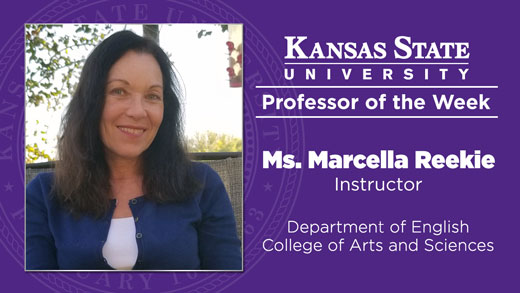 Marcella Reekie, an instructor in the English department in the College of Arts and Sciences, was recognized as Professor of the Week at the Jan. 7 men's home basketball game.
Marcella Reekie, an instructor in the English department in the College of Arts and Sciences, was recognized as Professor of the Week at the Jan. 7 men's home basketball game.
Reekie teaches Written Communications for Engineers, which prepares upper-level engineering students to gather, use, and present technical information in a professional setting. She received an Open/Alternative Textbook grant to develop a free textbook for the course — it now has more than 7,500 downloads, including global.
In addition to her teaching, she serves on technical writing and award committees. Over the years, 49 of her students have won first, second, or third place in the Technical Writing competition, and her student won the Kirmser grand prize in this year's non-freshman category. She is also a recipient of the English department's faculty award for excellence in undergraduate teaching. She is a recipient of the 2019 Commerce Bank and W.T. Kemper Foundation Undergraduate Outstanding Teaching Award.
The Professor of the Week recognition is coordinated by Faculty Senate, the president's office, K-State Athletics and the Division of Communications and Marketing. Recipients are faculty members selected by Faculty Senate caucuses. Those selected are provided tickets to a men's home basketball game of their choosing and are recognized during halftime. This is a small token of appreciation for those who teach at K-State.
Vet med researcher receives $1.6 million NIH grant to uncover mysteries behind Parkinson's disease
 A new research grant for Yulan Xiong, assistant professor of anatomy and physiology at the Kansas State University College of Veterinary Medicine, focuses on gaining a better understanding of the physiological causes of Parkinson's disease.
A new research grant for Yulan Xiong, assistant professor of anatomy and physiology at the Kansas State University College of Veterinary Medicine, focuses on gaining a better understanding of the physiological causes of Parkinson's disease.
The National Institute of Neurological Disorders and Stroke awarded Xiong with more than $1.6 million for a five-year project, "Molecular regulation of LRRK2 in Parkinson's disease." This award is from the research project grant program R01 at the National Institutes of Health.
Xiong's work in Parkinson's disease has also been supported by an NIH K01 Mentored Research Scientist Development Award and several awards from well-recognized foundations and agencies, including the Parkinson's Foundation Stanley Fahn Junior Faculty Award, William N. and Bernice E. Bumpus Foundation Innovation Award, and an American Parkinson's Disease Association research grant.
"According to the National Institutes of Health, 1 million people in the United States are suffering from Parkinson's disease," Xiong said. "Unfortunately, there is no cure or proven therapy for this disease."
Parkinson's disease is recognized as the most common movement disorder affecting up to 1% of the population above the age of 60 and 4-5% above the age of 85.
"The cardinal symptoms of the disease are caused by the loss of brain cells — called dopaminergic neurons — in the midbrain and deficits in the striatum, which is the area of the brain that controls motor function and reward systems," Xiong said.
Mutations in the Leucine-rich repeat kinase 2 gene, or LRRK2, account for up to 40-50% of Parkinson's disease in certain populations and are the most known common causes for the disease, Xiong said.
"Given its strong genetic links and compelling drug ability, LRRK2 represents a clear target for therapeutic development," she said. "But how the function of LRRK2 is regulated in Parkinson's disease is poorly understood."
The objective of Xiong's study is to answer that question. Her group will first identify and characterize the key regulator for the LRRK2 gene, then determine how it regulates LRRK2 cellular function, and explore how this regulation affects LRRK2 function in striatum and related motor function in mammalian model systems.
"We believe new knowledge about this aspect of LRRK2 biology will advance our understanding of the physiologic and pathophysiologic actions of LRRK2," Xiong said. "We hope it leads to the potential identification of novel targets for future pharmacologic intervention and treatments for Parkinson's disease."
K-State Student News
Model United Nations team wins awards at American Model UN
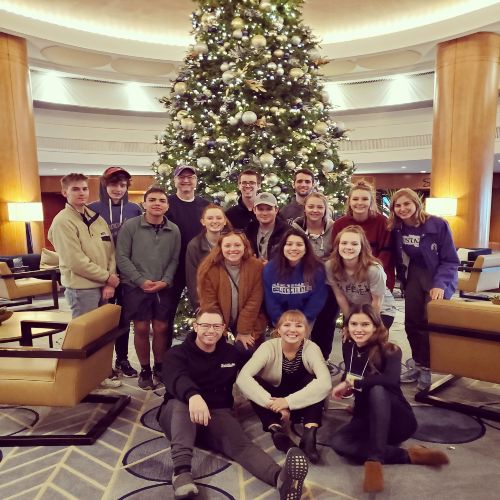 K-State's Model United Nations team competed at the 30th American Model UN Conference in Chicago from Nov. 23-26. More than 1,200 students from 77 colleges and universities competed to win for their designated countries.
K-State's Model United Nations team competed at the 30th American Model UN Conference in Chicago from Nov. 23-26. More than 1,200 students from 77 colleges and universities competed to win for their designated countries.
K-State's team chose to represent Equatorial Guinea and won a position paper award for completing policy position papers for every simulated situation at the conference. Two team members, Claire Chaffin, junior in political science and French minor; and Scout Molder, freshman in political science and pre-law, also won a delegation award for exceptional representation of Equatorial Guinea on the Economic Commission of Africa. This is the first time in almost seven years that K-State has won this award.
K-State's Model UN team members included Jennifer Acosta, Nathan Bothwell, Claire Chaffin, Ethan Chapman, Bayley Clark, Lily Colburn, Erick Echegaray, Ashley Fox, Natalie Jabben, Nicholas Kaechele, Nick McCreight, Scout Molder, Alexa Scheer, Bella Villegas and Mason Witzke.
Political science associate professors John Fliter and Carla Martinez-Machain served as co-faculty advisors for the team.
K-State crops team sweeps top individual awards to win 2019 National Championship
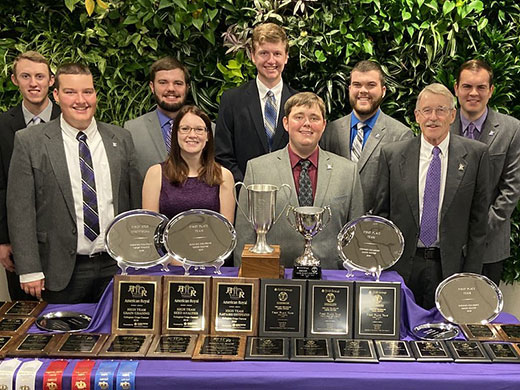 Kansas State University’s Collegiate Crops Team won the national championship for the 17th time in the past 21 years. The 2019 team includes (l to r) Luke Ryan (assistant coach), Alex Kaufmann, Evan Bott, Madison Tunnell, Blake Kirchhoff, Nate Dick, Noah Winans, Kevin Donnelly (coach) and Trevor Mullen.
Kansas State University’s Collegiate Crops Team won the national championship for the 17th time in the past 21 years. The 2019 team includes (l to r) Luke Ryan (assistant coach), Alex Kaufmann, Evan Bott, Madison Tunnell, Blake Kirchhoff, Nate Dick, Noah Winans, Kevin Donnelly (coach) and Trevor Mullen.
The Kansas State University crops team recently captured the title of national champions by winning the Kansas City American Royal Collegiate Crops Contest on Nov. 19 and the Chicago Collegiate Crops Contest on Nov. 23. K-State teams have now won the collegiate crops contest championship in 17 of the past 21 years.
The University of Wisconsin-Platteville was second at both events. Iowa State University was third in Kansas City and Purdue University took third in Chicago.
Official members of the K-State team were junior Blake Kirchhoff, Hardy, Nebraska, and seniors Noah Winans, Tekonsha, Michigan, and Nate Dick, Inman, Kansas. Alternate contestants were junior Madison Tunnell, Olathe, Kansas and sophomores Alex Kaufmann, Concordia, Kansas; Evan Bott, Palmer, Kansas; and Trevor Mullen, Salina, Kansas. All are agronomy majors at K-State.
In both contests, the K-State team took first place in all three phases of the contest: plant and seed identification, seed analysis and grain grading. In addition, team members swept the one-two-three individual overall placings at both events. Such a sweep of all three contest components and the top three individual placings at both contests is very rare, and has only been accomplished three times before in the 86-year history of the events, all by K-State.
At Chicago, Blake Kirchhoff was first place individual overall, and he won all three contest components. Nate Dick was second overall, placing second in identification and grain grading, and third in seed analysis. Noah Winans came in third, placing second in seed analysis and fifth in identification and grain grading.
At Kansas City, Blake Kirchhoff was also the top individual, placing first in grain grading with a perfect score, second in identification, and fifth in seed analysis. Noah Winans was second high individual. He also made a perfect score in grain grading to tie for first, and he placed third in both seed analysis and identification. Nate Dick was third overall, placing first in identification, second in grain grading, and sixth in seed analysis.
The team was coached by Kevin Donnelly, K-State professor of agronomy. Luke Ryan, junior in agronomy from Solomon, Kansas, was the assistant coach.
In the contests, participants are required to identify 200 different plant or seed samples of crops and weeds; grade eight different samples of grain according to Federal Grain Inspection Service standards; and analyze 10 seed samples to determine what contaminants they contain.
The American Royal coordinated the Kansas City contest. Corteva Agriscience was the primary awards sponsor. Additional sponsors were GFG Ag Services, American Society of Agronomy, Association of Official Seed Analysts, and South Dakota Crop Improvement Association.
The primary sponsor of the Chicago contest was the CME Group. Additional donors in Chicago included the Crop Science Society of America, Growmark Cooperative, and the Society of Commercial Seed Technologists.
Locally, sponsors for the K-State Crops Team include the Kansas Crop Improvement Association, K-State Department of Agronomy, K-State College of Agriculture, and the K-State Student Government Association.
For its performance, K-State received a team scholarship award from contest sponsors at Kansas City, and CME Group provided individual scholarships to the top five students at Chicago.
More information is available about agronomy education at K-State.